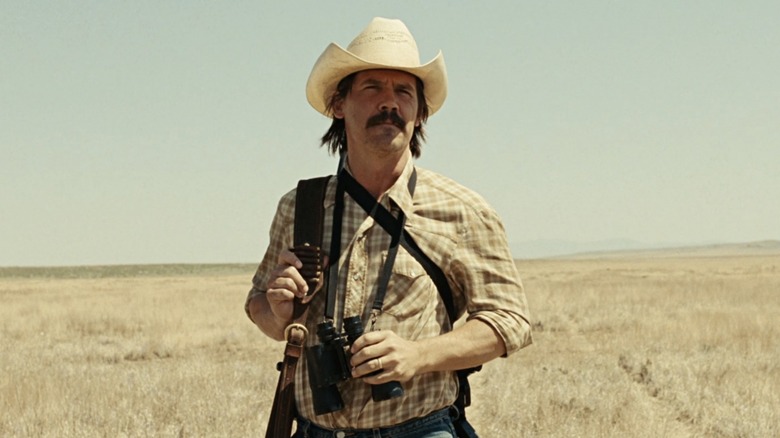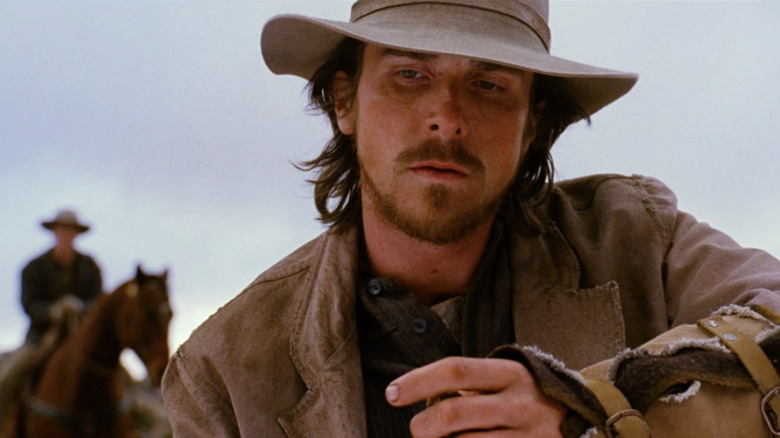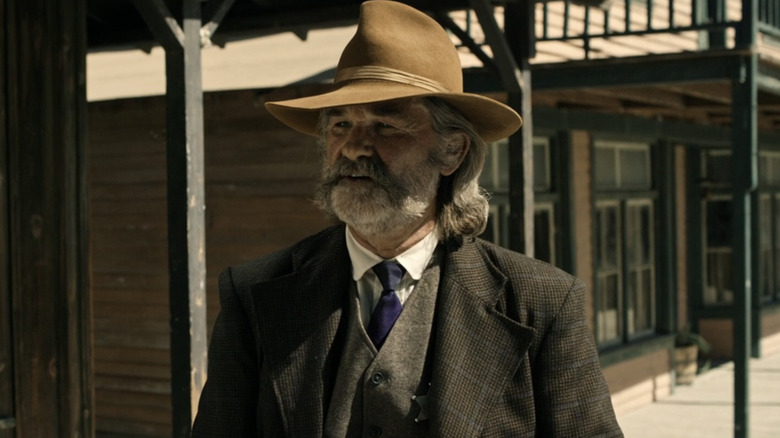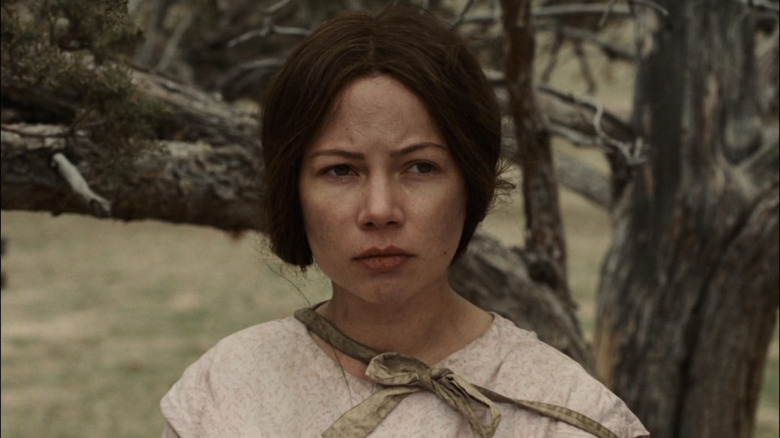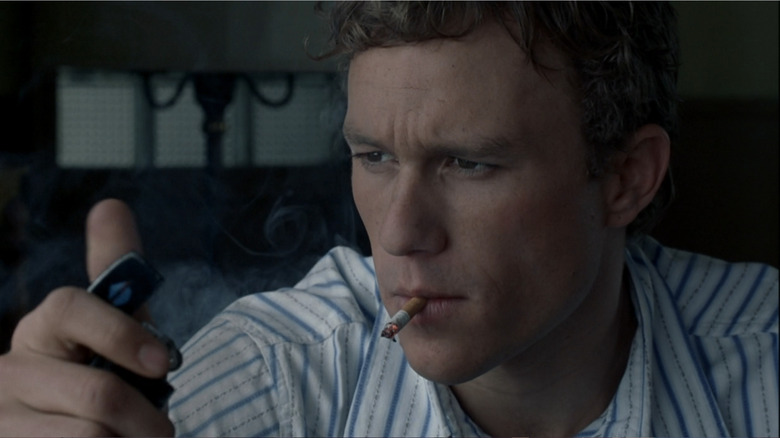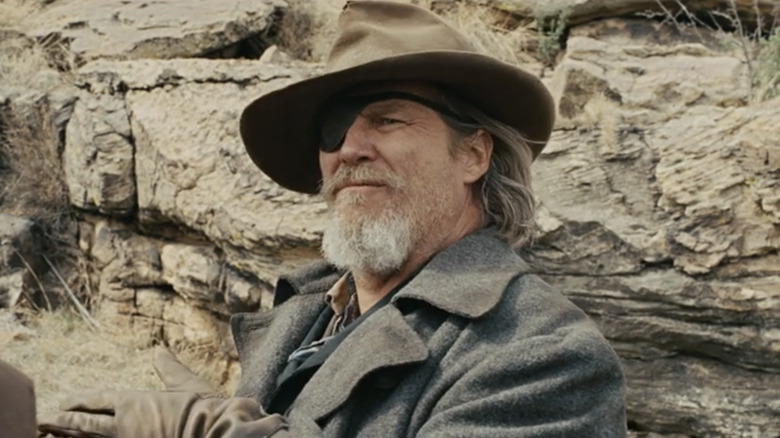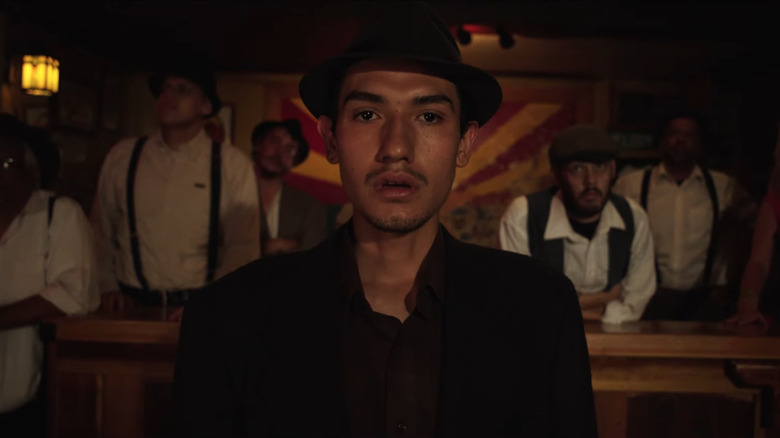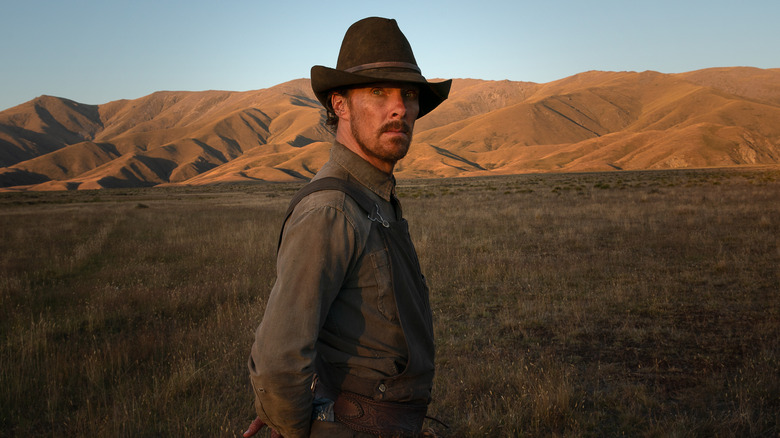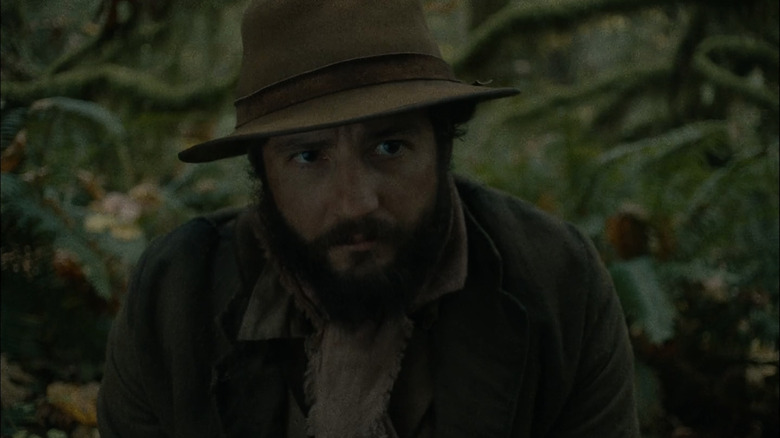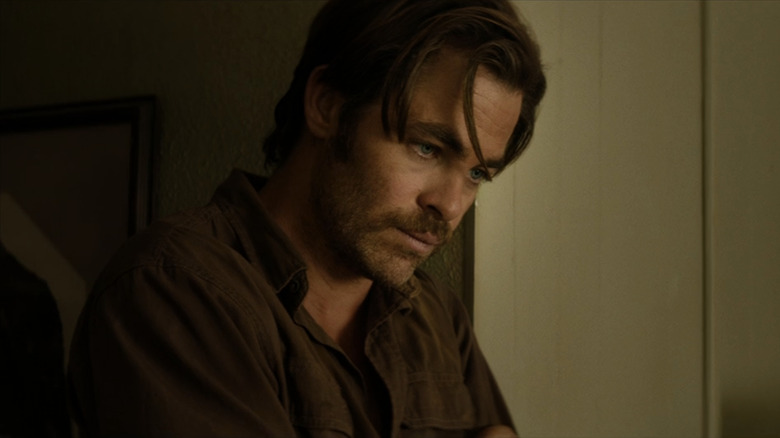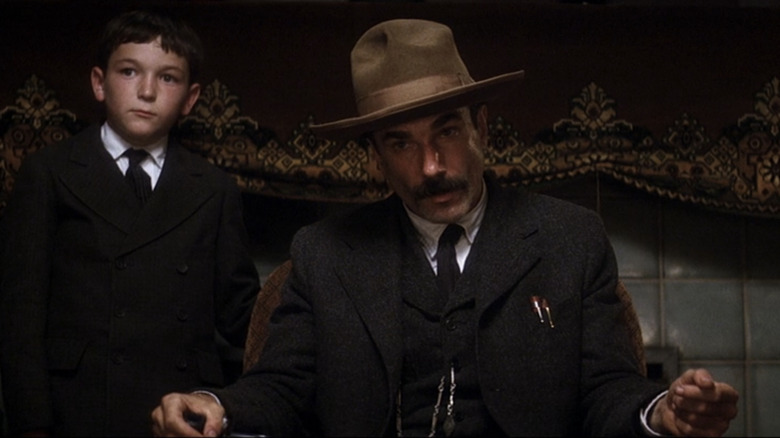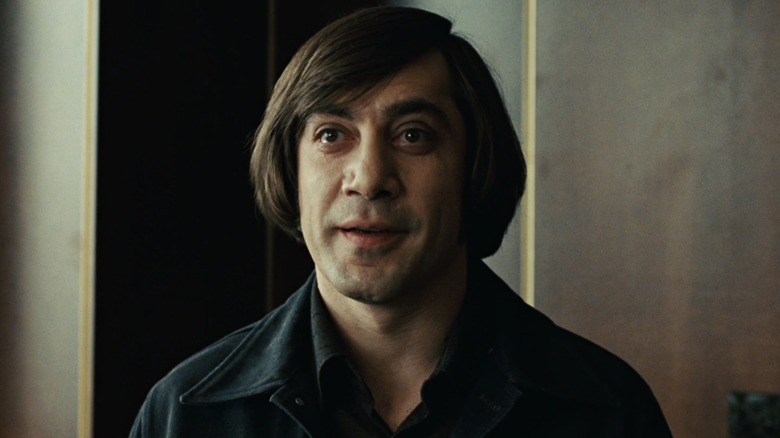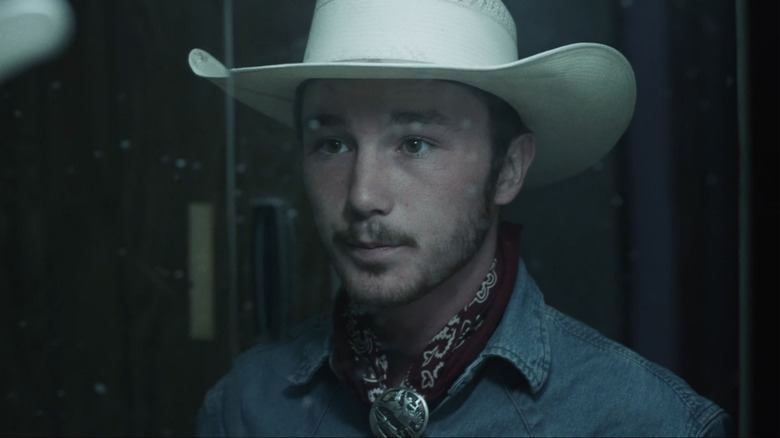The 12 Best Westerns Of The 21st Century
Clint Eastwood's mournful 1992 Western "Unforgiven" is a tale of aging gunfighters whose violent heyday is already becoming the stuff of myth and legend. The Oscar-winning film served as not just Eastwood's personal farewell to the genre that made him famous, but a fitting end to a hundred years of pop entertainment. The Western was one of Hollywood's earliest genres, and for most of the 20th century, tales of cowboys, outlaws, and pioneers were the backbone of the film industry, powering everything from prestige pictures like "How the West Was Won" to schlock like "Jesse James Meets Frankenstein's Daughter." By the early 1990s, however, the Western had largely disappeared from the cinematic landscape. Beyond a handful of oaters spurred on by the success of "Unforgiven," it really did seem like the Western's day was finally done.
But now, in the third decade of the 21st century, it's clear that the genre never really left us. The last 20-something years have seen dozens of excellent Westerns, from quirky exercises like "Slow West" and "The Sisters Brothers" to revisionist spectacles like "The Harder They Fall." On television, "Yellowstone" and its spin-offs are some of the most popular shows of the day, while David Milch's "Deadwood," arguably the greatest Western of the 21st century, misses this list on a technicality (it's a TV series, not a film). Even Eastwood got back on the horse for 2021's "Cry Macho." Despite its conservative reputation, the Western has always been deeply ambivalent about traditional notions of masculinity, race, sex, violence, and the American experiment, and latter-day releases are no different. Let's take a look at 12 of the best Western films of the 21st century.
3:10 to Yuma
An honest rancher and a gentleman bandit go head to head in James Mangold's 2007 remake of "3:10 to Yuma." When well-known bank robber Ben Wade (Russell Crowe) is finally captured in Arizona Territory, Civil War veteran Dan Evans (Christian Bale) joins the posse to deliver Wade to the titular afternoon train to Yuma, where Wade will be tried and likely hanged for his crimes. But getting this outlaw to the train on time is harder than it would seem, as Evans contends with Native war parties, Wade's psychopathic lieutenant (Ben Foster), and his own insecurities.
Based on an early short story by crime novelist Elmore Leonard, which was then adapted into a 1957 film, "3:10 to Yuma" is old-fashioned in the best sense. Mangold and screenwriters Michael Brandt, Halsted Welles, and Derek Haas (who would go on to create the "One Chicago" franchise on NBC) look back to the revisionist Westerns of the 1950s, where the unforgiving wilderness was as much a psychological reckoning as a physical one, and men's weaknesses were laid bare under the sun for all to see. Evans volunteers because he worries he's lost the respect of his wife (Gretchen Mol) and son (Logan Lerman) — a pain made all the more acute by how effortlessly Wade charms them both. Mangold came out of the 1990s independent film scene, but his steady, unpretentious direction on studio hits like this and the Johnny Cash biopic "Walk the Line" helped earn his reputation as one of the great Dad Movie auteurs of our time.
Bone Tomahawk
A grizzled Texas sheriff (Kurt Russell) leads an unsteady posse into hostile territory in search of his kidnapped deputy (Evan Jonigkeit) and the daughter (Lili Simmons) of the town doctor (Patrick Wilson). It's a stock Western premise, not a million miles removed from something like John Ford's "The Searchers," but S. Craig Zahler's 2015 debut feature "Bone Tomahawk" offers up a gruesome, horror-infused twist: The kidnappers are not outlaws or Comanche raiders, but a mute tribe of inbred, cave-dwelling cannibals referred to by one character as "troglodytes." These warriors may be brutal, but the journey to find them is just as dangerous, filled with infection, bullets, and the unforgiving harshness of nature.
Zahler's slow-burn genre hybrid is at times charmingly low-budget, with off-the-rack costumes and a Western town set that looks more like a theme park than an actual turn-of-the-century settlement. But if Zahler's scrimped on some elements, he knew where to make his money count, assembling an impressive and eclectic cast with one-scene cameos by David Arquette, Fred Melamed, Zahn McClarnon, Sean Young, and B-movie legends Sid Haig and James Tolkan. Zahler fills his desolate landscape and the lengthy running time with clever, just-this-side-of-purple dialogue; Jenkins, as an old codger who can't keep his mouth shut, becomes something of an unofficial narrator. And the film's brutal violence is just as impressively staged as the script's florid speeches, pushing past Zahler's dicey premise (an indigenous tribe of literal "savages") with the courage of its convictions.
Meek's Cutoff
Filmmaker Kelly Reichardt has long chronicled the lives of young people in the Pacific Northwest who are metaphorically or spiritually lost. For the 2010 film "Meek's Cutoff," she and writer Jonathan Raymond turn back the clock to 1845 and the early days of the Oregon Trail, where being lost was not just a state of mind, but a very real physical danger. Reichardt muse Michelle Williams leads a cast that includes Zoe Kazan, Paul Dano, and Will Patton as a group of settlers journeying west. They hire a wooly mountain man, the eponymous Meek (Bruce Greenwood), to lead the way but soon find themselves off the trail, adrift in a desolate landscape with very few identifying markers. When a Native American man (Rod Rondeaux) crosses their path and seems to know his way out of the wilderness, the settlers are torn between following the white man in whom they've already placed so much trust, or the stranger they've been raised to view as an enemy.
Where most Westerns take advantage of the land's natural expansiveness with widescreen vistas, Reichardt takes the opposite tack, shooting in a tight, narrow 1.33:1 box. And while stillness and silence have long been the tools of this director's trade, here they take on existential dread. It was rare at the time for Reichardt to work with so many professional, well-known actors, but they are uniformly excellent, especially Williams as the de facto leader of the settlers and Greenwood as the inscrutable, ultimately useless Meek. Despite its PG rating, "Meek's Cutoff" is a grim, haunting parable that doesn't shy away from the realities and dangers of frontier life.
Brokeback Mountain
In 1997 Annie Proulx wrote the short story "Brokeback Mountain" for The New Yorker, about a pair of young cowboys in 1960s Wyoming who fall in love while herding sheep together on the eponymous mountain. The men, Jack Twist and Ennis Del Mar, insist that neither is gay, but the events of that fateful summer reverberate through the rest of their lives. Ennis descends into alcoholism and depression, alienating him from his wife and daughter, while Jack marries rich and spends his idle time indulging in increasingly reckless behavior to try to recapture the passion he felt with Ennis. Spanning two decades, the story ends in inevitable tragedy for two men who could not live with each other but couldn't live without.
Ang Lee's sensitive 2005 adaptation was scripted by Diana Ossana and "Lonesome Dove" novelist Larry McMurtry, who make only minimal changes from the short story. The plot closely follows Proulx's spare, effortlessly poetic prose, and much of the dialogue is taken verbatim from the page; McMurtry and Ossana won an Oscar for their efforts. Stars Jake Gyllenhaal and Heath Ledger were nominated for their performances as Jack and Ennis, along with Michelle Williams (Ledger's real-life partner at the time) as Ennis' long-suffering wife. The film became a culture war flashpoint, arriving amidst the nationwide battle for same-sex marriage, but neither it nor Proulx's original story is a political tract. The tragedy of Jack and Ennis comes not just from a culture of bigotry and hatred, but from the cowboy stoicism that young men are expected, if not demanded, to perform. As Ennis says, "If you can't fix it, you've got to stand it."
True Grit
Western imagery has long been a part of Joel and Ethan Coen's cinematic vocabulary, from the desert-set "Blood Simple" and "Raising Arizona" to Sam Elliott's cowboy narrator in "The Big Lebowski." But in the 21st century, they have made several full-on oaters, the most traditional of which is their 2010 remake of John Wayne's 1969 classic "True Grit." Hailee Steinfeld (in her Oscar-nominated breakthrough role) stars as Mattie Ross, a precocious and pious Arkansas teen who hires disgraced one-eyed U.S. Marshal Rooster Cogburn (Jeff Bridges) to hunt down the man who murdered her father. Together with a talkative Texas Ranger (Matt Damon), Mattie and Rooster journey deep into the wild.
Compared to their more irony-laced genre riffs like "Lebowski" or "Miller's Crossing," "True Grit" is a surprisingly straightforward, even sincere, film from the Coens. There are some surreal inventions that mark the brothers' sensibility, such as a meeting in the woods with a man (Ed Corbin) dressed as a bear, and a cast that includes Josh Brolin, Barry Pepper, and Elizabeth Marvel as a grown Mattie, narrating from middle age. But the film sticks pretty close to Charles Portis' original 1968 novel and leans hard into its biblical symbols. Mattie's time in the wilderness is a spiritual trial, and she learns that she can't live in the world without being poisoned (literally) by sin. It's as much a religious picture as the Coens' previous film, 2009's riff on the book of Job, "A Serious Man."
Bisbee '17
Somewhere between "The Act of Killing" and "Waiting for Guffman" sits "Bisbee '17," the odd, damning 2018 documentary from director Robert Greene. In 1917, around 1,300 copper mine workers in Bisbee, Arizona — most of whom were immigrants — went on strike. In response, a posse of 2,000 men rounded up the strikers, loaded them at gunpoint into cattle cars, and shipped them 200 miles into the New Mexico desert to fend for themselves. Known as the Bisbee Deportation, the event is a dark chapter in the history of the labor movement and of Bisbee itself, where descendants of the strikers and of the posse still live. In 2017, the town chose to honor the centennial of the deportation by organizing a massive reenactment.
Like Greene's other films, "Bisbee '17" is a tricky hall-of-mirrors act. We listen to the townspeople talk about the deportation in candid moments and staged interviews, but Greene also films scenes of the reenactment as though it were a fictional film. Young actor Fernando Serrano, playing a striking worker, seems to be having a political awakening in real-time, as his role in the pageant forces him to confront how his mother was deported when he was a boy. Others involved, on the other hand, seem to be oblivious to any modern considerations of the Bisbee Deportation, content to play cowboy dress-up. The climactic reenactment, with a crowd of armed white men marching through the streets, just as their forefathers had a century before, is a harrowing vision of how close the past remains to the present.
The Power of the Dog
Controversy surrounded the release of Jane Campion's 2021 Western "The Power of the Dog." Longtime cowboy star Sam Elliott took exception to its depiction of frontier masculinity in crisis on Marc Maron's "WTF" podcast. He later walked back his words, which many fans interpreted as sexist and homophobic, but one can see why the film might have rubbed him the wrong way: It is, in large part, about how ridiculous and exhausting it is for a grown man to play cowboy.
Benedict Cumberbatch stars as Phil Burbank, an overbearing Montana landowner who dresses like a ranch hand and abides by a severe Western philosophy handed down to him as a young man. But it is the 1920s; the women in town wear their hair bobbed and listen to the radio, and the kind of cowboy Phil pretends to be is increasingly only ever seen in silent movies. When his brother (Jesse Plemons) brings home a new wife (Kirsten Dunst) and grown stepson (Kodi Smit-McPhee), these strangers — particularly the wispy and effeminate Peter — awaken a cruel streak in Phil that leads to tragedy. Campion shot the film in her native New Zealand, and the unfamiliar landscape gives this American tale an alien, surreal look, not unlike the "spaghetti Westerns" of the 1960s and '70s that were shot in Italy and Spain. Like many Westerns on this list, it takes place in the frontier of the mind as much as any physical location.
First Cow
Nearly a decade after the grim march of "Meek's Cutoff," Kelly Reichardt returned to days gone by with the gentle "First Cow." Beginning with the modern-day discovery of two skeletons buried side by side, the film takes us all the way back to the 1820s, when the Oregon territory was at the mercy of competing American, Russian, and British interests. Cookie (John Magaro), a sensitive Boston baker working for loutish fur trappers, makes fast friends with King-Lu (Orion Lee), a Chinese immigrant on the run for murder. When the local settlement receives its first milking cow, owned by the local British bigwig (Toby Jones), Cookie and Lu take to milking the cow under the cover of night and selling the cakes and biscuits they make with it each day. Their oily cakes become a sensation, but no crime, even a relatively innocent one like milking another man's cow, can go undiscovered forever.
Where "Meek's Cutoff" emphasizes the desolate, alien experience of the Oregon Trail, "First Cow" is all about how little distance there is between then and now. The film transitions from the modern day to two centuries prior in a single cut, finding Cookie in the exact same lush forest as the 21st-century hiker (Alia Shawkat) who finds his remains. For Reichardt, there is no difference between the present and the past; the rich and powerful still hoard their wealth, immigrants are still looked on as outsiders, and the only way to win a rigged game is to cheat.
Hell or High Water
A pair of Lone Star country boys knock off a string of banks to save the family ranch. One brother is careful while the other is reckless. A long-in-the-tooth Texas Ranger (Jeff Bridges) and his partner (Gil Birmingham) saddle up to investigate, but it seems that no one, even those who got robbed, are all that interested in cooperating with the law. That's a string of cliches that could take place in the 1880s or the 1930s, but 2016's "Hell or High Water" brings them to brilliant, idiosyncratic life in the 21st century, courtesy of Taylor Sheridan's screenplay, David Mackenzie's direction, and sharp, lived-in performances from stars Chris Pine and Ben Foster opposite Birmingham and Bridges.
Future "Yellowstone" creator Sheridan gives bank-robbing brothers Toby (Pine) and Tanner (Foster) a backstory filled to the brim with hot-button issues of the day, from reverse mortgages and foreclosures to the crippling cost of healthcare in America — plus a melodramatic plot point involving a secret oil deposit for good measure. It would be all too much under normal circumstances, but the script allows Sheridan's characters to be characters, not just plot-delivery machines. Everyone from the top-billed stars to one-scene wonders like "Prey" star Amber Midthunder and character actress Dale Dickey (as a sardonic bank teller) gets a chance to breathe and live on screen, and that extra care turns what could have been two hours of tired tropes into one of the best films of the 2010s.
There Will Be Blood
With the possible exception of the villain of the next film, there is no nastier piece of work on this list than Daniel Plainview (Daniel Day-Lewis), the oil man in Paul Thomas Anderson's "There Will Be Blood." He starts the film in a hole in the desert, nearly killing himself for a cup of gold dust. A few years after that, he is well-dressed and respectable, using the orphaned son (Dillon Freasier and Russell Harvard) of one of his workers as a prop, selling himself as a family man to the rubes whose underground wealth he covets. Daniel's brutish personality requires that all in his orbit bow to his will, but he meets his match in Eli Sunday (Paul Dano), a baby-faced preacher with his own dreams of unlimited wealth and influence.
Based loosely on Upton Sinclair's 1926 novel "Oil!," Anderson's script distills the political theories of its source material into a portrait of a singular, monstrous man. Day-Lewis' powerhouse performance has been rightly lauded over the years for its grandiose moments, as when he subjects himself to a humiliating testimony in front of Eli's congregation, or his famous explanation of the concept of drainage ("I drink your milkshake! I drink it up!"). But he is more terrifying in the quiet moments; when speaking to his long-lost brother, the word "people" comes out of his mouth like a predator fantasizing about his prey. Was Daniel Plainview born with a bottomless need for wealth and power, or was he simply a man who met his moment more ruthlessly than most? For those people he hurt, swindled, abandoned, and killed, what difference does it make?
No Country for Old Men
"Every generation thinks it's the last, thinks it's the end of the world," Wilco once sang, which neatly sums up one of the themes of Joel and Ethan Coen's 2007 masterpiece "No Country for Old Men." Based on the 2005 novel by Cormac McCarthy (with a title taken from W. B. Yeats), the film examines the avarice and empty violence of the new West, symbolized by a satchel of drug money in 1980s South Texas. When local hunter Llewlyn Moss (Josh Brolin) comes upon the aftermath of a drug deal gone terribly wrong, he takes the satchel for himself, but that decision puts him in the crosshairs of hitman Anton Chigurh (Javier Bardem in an Oscar-winning performance), a single-minded psychopath with a Daniel Plainview-like contempt for his fellow man. Bringing up the rear is small-town sheriff Ed Tom Bell (Tommy Lee Jones), an old-school Western lawman who finds himself increasingly adrift in a world that seems to have lost all meaning.
Many Westerns (and Western fans) subscribe to the idea that the world has only recently taken a turn for the worse and that previous generations were made of sterner, more righteous stuff than us; Ed Tom certainly does, and he takes the terrible violence wrought by Chigurh as a sign that things have finally moved beyond the pale. But a late-film conversation with his uncle (Barry Corbin) about a horrifying experience within their own family sets the record straight: The world has always been a violent, heartless place, and the best any of us can do is carry a little fire for those still behind.
The Rider
The question of why anyone would want to be a cowboy these days, much less need to be one, is at the heart of Chloé Zhao's breakthrough feature, 2017's "The Rider." Enlisting a cast of non-professional actors from the Pine Ridge Reservation in South Dakota, the film tells the story of Brady Blackburn (real-life horse trainer Brady Jandreau), a Lakota rodeo rider recovering from a terrible accident. Living back on the reservation with his father and sister (played by Jandreau's real-life family), Brady is adrift until he begins to work with Apollo, an unbroken horse who needs as much work as Brady himself does. Before long, he plans his return to the rodeo circuit, but his injuries cannot be wished or dreamed away; his doctor warns that another ride could kill him.
The film draws heavily from Jandreau's own life, even including footage of a real accident he suffered on a horse in 2016. He and Zhao met years before on a different film, and she was quickly impressed with his expressiveness and ability to coax feelings out of his horses. While technically a work of fiction, the film's most transcendent moments come when Zhao aims her camera at Brady as he trains horses and trains others to ride rough stock as he once did. By the film's cathartic ending, the question is not why anyone would want to be a cowboy, but why anyone would ever want to be anything else.
